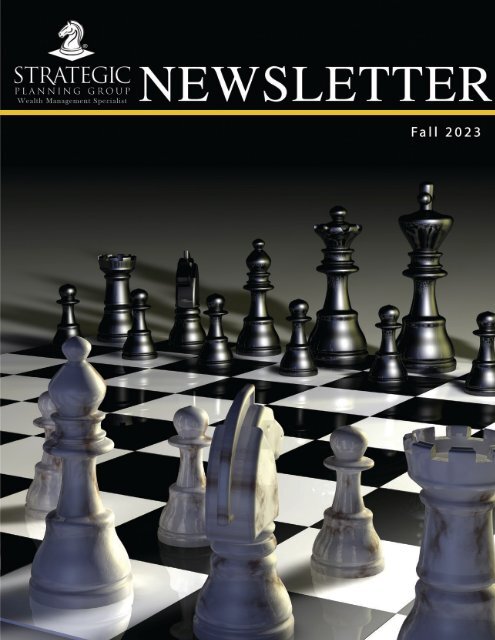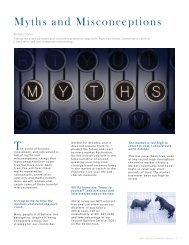Strategic Planning Group Fall 2023 Newsletter
Create successful ePaper yourself
Turn your PDF publications into a flip-book with our unique Google optimized e-Paper software.
1 <strong>Strategic</strong> <strong>Planning</strong> <strong>Group</strong>
CONTENTS<br />
pg. 3<br />
The Contagion of Common Sense is<br />
Rapidly Emerging<br />
by Ryan Craner<br />
Ryan compares current divisive times to the past,<br />
optimistic about the return of common sense.<br />
pg. 6<br />
Understanding Recessions:<br />
Navigating the Natural Ebbs and Flows of the Economy<br />
by John Park<br />
John discusses the possibility of a recession and<br />
provides financial advice for navigating it.<br />
pg. 8<br />
Breaking News:<br />
Good Things Are Happening Constantly<br />
by Tom Craner<br />
Tom encourages staying optimistic amid<br />
political and global developments.<br />
pg. 3<br />
The Contagion of Common Sense<br />
is Rapidly Emerging<br />
<strong>Strategic</strong> <strong>Planning</strong> <strong>Group</strong> 2<br />
pg. 10<br />
China’s House of Cards<br />
by Alex Craner<br />
Alex highlights China’s internal challenges<br />
and their potential global consequences.<br />
pg. 13<br />
Find the Object Activity<br />
pg. 14<br />
Meet the Team
The Contagion of Common Sense<br />
is Rapidly Emerging<br />
By Ryan Craner<br />
Taking the client advocate and consumer protection approach, Ryan has always viewed every<br />
client as a long-term and very important relationship.<br />
A Look Back and Ahead. Our Society has had a Rough Three or Four Years.<br />
When you look at our world,<br />
our country, our cities over<br />
the last three years, for many, it<br />
is frightening and depressing.<br />
In early 2020, we experienced<br />
the largest and most devastating<br />
pandemic in world history. We<br />
experienced the most draconian<br />
lockdowns, vaccine mandates,<br />
mask mandates, and restriction<br />
on lifestyle and commerce that<br />
have ever been imposed on the<br />
American public. We watched<br />
our country descend into<br />
incredibly divisive arguments<br />
over how to respond to this<br />
pandemic. Perhaps some of<br />
these lockdowns and mandates<br />
were necessary, and perhaps<br />
some of them were overboard.<br />
By the summer of 2020,<br />
beginning with the murder of<br />
George Floyd, we saw protests<br />
and riots break out in nearly all<br />
of our major cities. Some were<br />
very violent, and some were<br />
peaceful. All of them appeared<br />
to involve burning buildings<br />
and communities. Countless<br />
businesses and residences were<br />
destroyed, burned, or looted.<br />
Police officers were killed and<br />
wounded, and protesters died,<br />
while thousands were injured.<br />
We have seen policies coming<br />
out of the pandemic and<br />
protests that make absolutely no<br />
sense. Things like, defunding the<br />
police, no bail rules, and local<br />
and state prosecutors that refuse<br />
to prosecute violent crime. As<br />
a result, we’ve seen the murder<br />
rate and violent crime skyrocket<br />
in nearly all of our major cities.<br />
Local leaders and mayors have<br />
gravitated toward a policy of<br />
“compassion and rights” for<br />
the homeless. This policy has<br />
resulted in massive homeless<br />
camps, grotesquely insanitary<br />
conditions, and we’re witnessing<br />
hopeless untreated mental<br />
illness and addiction right in<br />
front of our eyes. The policy in<br />
the past was such that when a<br />
mentally ill or addicted homeless<br />
person began to sleep or camp<br />
out on a sidewalk, local officials<br />
would triage that person’s<br />
needs and get them access<br />
to mental health resources,<br />
addiction treatment, housing<br />
assistance, and various other<br />
support that is already available<br />
in our communities. Leaders in<br />
3 <strong>Strategic</strong> <strong>Planning</strong> <strong>Group</strong>
most of our large cities today<br />
have abandoned these policies<br />
in favor of what they call<br />
“compassion” and “rights,” and<br />
the results are horrific.<br />
We have watched legitimate<br />
and vital businesses like grocery<br />
stores and other important<br />
retailers looted and destroyed<br />
by marauding groups of usually<br />
young able-bodied people. The<br />
word is out, “you will not be<br />
prosecuted for such crimes.” As<br />
a result, we watch store after<br />
store in city after city close or<br />
relocate, making it even harder<br />
for low-income urban residents<br />
to survive.<br />
We have seen the most divisive<br />
politics in two generations. At<br />
the presidential politics level,<br />
the now toxic and activist media<br />
on both sides, is convincing<br />
people that if their candidate<br />
loses, it will be the “end of the<br />
world.” Today’s extreme “take<br />
no prisoners” media is here to<br />
make you feel even worse about<br />
all world events. This has been<br />
a very deep division and an<br />
extreme societal separation.<br />
It is these extremes that make<br />
the next cyclical stage even<br />
more exciting and optimistic.<br />
Now, Let’s Move On<br />
To The Good News!<br />
We Will Get Better<br />
Because We Have<br />
Been Here Before.<br />
We have done this before, and<br />
not just once. We have seen<br />
periods of extreme division and<br />
protest before. We have seen<br />
what seems like lawlessness and<br />
a failure of our entire system.<br />
Each time we have done this,<br />
protest occurred, the division<br />
deepened, and then we changed.<br />
Society gets better, and common<br />
sense returns. Optimism and<br />
confidence are restored, and<br />
everyone feels better each time.<br />
The last time we, as a country<br />
and society, did this was from<br />
1968 through 1974. The Vietnam<br />
War was incredibly divisive;<br />
we saw countless protests,<br />
both violent and nonviolent. A<br />
domestic terrorist group called<br />
the Weather Underground<br />
was very active in protesting<br />
the Vietnam War. They were a<br />
leftist, heavily Marxist group in<br />
ideology. Sound familiar?<br />
The Weathermen detonated<br />
over 100 bombs on government<br />
and corporate targets. In<br />
their most egregious attacks,<br />
they bombed the US Capitol<br />
building, the Pentagon, and the<br />
State Department headquarters.<br />
They also bombed banks and<br />
corporate facilities of companies<br />
thought to support the war. The<br />
Weather Underground, on May<br />
31st, 1974, bombed the Office of<br />
the California Attorney General.<br />
The Weather Underground<br />
stated this was in response to<br />
the killing of six members of the<br />
Symbionese Liberation Army.<br />
On September 11th, 1974,<br />
they bombed the Anaconda<br />
Corporation (part of the<br />
Rockefeller Corporation). The<br />
Weather Underground stated<br />
this was in retribution for<br />
Anaconda’s alleged involvement<br />
in the Chilean coup in September<br />
1973, where a Marxist leader was<br />
removed from office.<br />
Have you been disgusted by<br />
today’s lack of “rule of law” in our<br />
country? It is not the first time!<br />
Here’s one for you from back in<br />
the last cycle in 1974. Two of<br />
the four founding members of<br />
the The Weather Underground<br />
never spent a day in jail. These<br />
are domestic terrorists who<br />
exploded over 100 bombs on<br />
government and corporate<br />
targets, three people died, and<br />
they never spent a day in jail!<br />
They spent about 10 years on<br />
the FBI ‘s most wanted list, and<br />
then it just kind of faded away,<br />
and they returned to our society<br />
as free citizens. To this day, they<br />
are alive and well. Their names<br />
are Bernadine Dohrn and Bill<br />
Ayers.<br />
The FBI, while investigating<br />
and pursuing the Weather<br />
Underground, was guilty<br />
of using illegal tactics and<br />
unconstitutional methods, such<br />
as break-ins of family members’<br />
homes of suspects without<br />
a warrant. (Sound familiar in<br />
today’s context?) The former FBI<br />
Associate Director and acting<br />
Director were prosecuted and<br />
convicted for these offenses,<br />
and later received a presidential<br />
pardon. (Again, sound familiar?)<br />
Now, the whole reason I tell you<br />
about the Weather Underground<br />
and the Vietnam War protest<br />
era in the late sixties and early<br />
seventies is because this was<br />
very similar to our past three or<br />
four years. We saw presidential<br />
<strong>Strategic</strong> <strong>Planning</strong> <strong>Group</strong> 4
impeachment hearings in the<br />
early 70s. We saw protests and<br />
violence. We saw corruption and<br />
illegal actions in our national law<br />
enforcement and intelligence<br />
agencies.<br />
And then we moved on… we<br />
improved, we got past it, and we<br />
became less divisive as a country<br />
and as a society.<br />
So now, for my official prediction:<br />
I am predicting a resurgence<br />
of common sense! I can tell<br />
you that voters in suburban<br />
San Francisco, Chicago, New<br />
York, Seattle, Los Angeles, and<br />
Portland are tired of not being<br />
able to drive downtown and go<br />
to their favorite restaurant, that<br />
they’ve gone to for decades, and<br />
they can’t right now because<br />
they don’t feel safe. They will<br />
likely have to walk through<br />
a danger zone to get to the<br />
restaurant. They don’t feel safe!<br />
The first wave of common<br />
sense will come in city council,<br />
mayoral, and gubernatorial<br />
elections. Any candidate from<br />
any party on either side of the<br />
political spectrum that is talking<br />
about and pledging common<br />
sense and unity and making the<br />
community safer will be elected.<br />
It will start at the local levels,<br />
and then this same wave of<br />
common sense will work its way<br />
up to congressional candidates<br />
and the presidential level as<br />
well. The American people are<br />
sick and tired of extremists and<br />
extremism! They are ready, more<br />
than ready, for common sense.<br />
So, be ready for the change<br />
because here it comes! Common<br />
sense is about to break out in a<br />
big way. It may be hit and miss at<br />
first and happen slowly, or it will<br />
likely happen very quickly.<br />
...we improved, we<br />
got past it, and we<br />
became less divisive<br />
as a country and as a<br />
society.<br />
I point out this period in the past<br />
(68-74) because we had reached<br />
an extreme division, politically<br />
and socially. We saw lawlessness<br />
and chaos, just like we have<br />
seen in the last three to five<br />
years. And you know what? Our<br />
country, our society, has done<br />
pretty darn good since 1974.<br />
We saw tremendous economic<br />
growth. We saw the booming<br />
1980s and the go-go 1990s.<br />
We saw our constitution work<br />
and our government function.<br />
We have had our trials and our<br />
setbacks, but predominately we<br />
saw prosperity and American<br />
greatness on full display. We saw<br />
our country come together and<br />
rise to incredible challenges,<br />
and we saw much better times!<br />
I can tell you without a doubt<br />
that the markets and the<br />
economy act in cycles and have<br />
remarkable similarity through<br />
each cycle.<br />
Mark Twain once said, “History<br />
never repeats itself, but it does<br />
often rhyme.” And I will go<br />
further and say that not only<br />
does history repeat itself, but<br />
the cycles socially and politically<br />
are remarkably similar as well.<br />
We are now overdue to move<br />
on from the pandemic and<br />
protest era. We are cyclically and<br />
historically ready to move on<br />
from an uncertain economy and<br />
markets to prosperity, unity, and<br />
American greatness!<br />
Sources:<br />
https://www.theodysseyonline.com/protests-that-changed-history<br />
https://www.cbsnews.com/minnesota/news/how-city-once-called-murderapolis-became-center-of-defund-the-policemovement-now-grappling-with-violent-crime-spike/<br />
https://www.nytimes.com/1983/12/01/us/two-top-fbi-officials-cleared.<br />
html https://www.collectorsweekly.com/articles/united-states-of-protest/<br />
5 <strong>Strategic</strong> <strong>Planning</strong> <strong>Group</strong>
Understanding Recessions:<br />
Navigating the Natural Ebbs and Flows of the Economy<br />
By John Park<br />
From investments to complicated retirement strategies, John works to educate and advise his<br />
clients on making smart financial decisions.<br />
There has been a lot of<br />
speculation throughout this<br />
year about the possibility of<br />
a recession. By way of high<br />
interest rates and tightening the<br />
money supply, the Fed has been<br />
aggressively battling inflation<br />
for some time. These measures<br />
have the potential to cause a<br />
recession. Ultimately, I’d much<br />
rather experience a recession<br />
than unchecked inflation. Let<br />
me state clearly though, I’m not<br />
saying we are in a recession right<br />
now, nor am I saying we are for<br />
certain going to be in one. It is a<br />
possibility, however. So, let’s talk<br />
about that.<br />
Many economists are predicting<br />
a mild to moderate recession<br />
due to the long-lived nature of<br />
our current battle with inflation<br />
and government spending.<br />
Be careful how you react to<br />
this though; these economists<br />
have been wrong before and<br />
many that I follow expected a<br />
recession to hit late last year or<br />
early this year. They have been<br />
wrong so far.<br />
Also, I will say there is an<br />
equal number of economists<br />
predicting a “Goldilocks” scenario<br />
where the economy’s reaction to<br />
battling inflation isn’t too hot or<br />
too cold, it’ll be just right. I hope<br />
that’s the case. I’ve been joking<br />
with my clients all year about<br />
my bold prediction of whether<br />
we’ll have a recession or the<br />
Goldilocks scenario: I’d give<br />
it a 50/50 chance either way.<br />
That’s my humble admission<br />
that I just can’t predict the<br />
future sometimes… Obviously<br />
a Goldilocks scenario is ideal.<br />
It won’t be a source of concern<br />
for investors though. So, I’m<br />
going to focus on the recession<br />
scenario in this article.<br />
The word "recession" often<br />
evokes apprehension and<br />
conjures images of plummeting<br />
stock markets, unemployment,<br />
and financial turmoil. However,<br />
it's essential to understand that<br />
recessions are a natural part<br />
of the economic cycle, just as<br />
growth periods are. They're not<br />
always severe, and with the<br />
right knowledge and strategies,<br />
individuals and businesses<br />
can navigate them adeptly. I<br />
want to help you have a proper<br />
perspective of recessionary<br />
times, if we are going to have<br />
one or are in one now.<br />
1. Nature of the Economic<br />
Cycle:<br />
Like the changing seasons, the<br />
economy undergoes phases –<br />
expansion, peak, contraction,<br />
and trough. A recession falls in<br />
the contraction phase, where<br />
economic activities decrease.<br />
Once the contraction ends,<br />
the economy moves into the<br />
trough and eventually back to<br />
expansion. Understanding this<br />
cycle helps demystify the nature<br />
of recessions.<br />
2. Not Always Severe:<br />
It's crucial to distinguish between<br />
a regular recession and more<br />
severe economic downturns<br />
like depressions. While the<br />
latter can last several years and<br />
cause significant distress, many<br />
recessions are relatively shortlived.<br />
The average post-World<br />
War II recession in the U.S.,<br />
for example, lasted about 11<br />
months.<br />
3. Causes:<br />
Recessions In<br />
Perspective<br />
Recessions can be triggered<br />
by various factors – from<br />
abrupt financial shocks and<br />
global events to accumulated<br />
imbalances in the economy. The<br />
cause often dictates the severity<br />
and duration of the recession.<br />
<strong>Strategic</strong> <strong>Planning</strong> <strong>Group</strong> 6
Smart Financial<br />
Decisions During<br />
Recessions<br />
1. Emergency Fund:<br />
We consistently recommend<br />
maintaining an emergency fund,<br />
and its importance becomes<br />
evident during recessions.<br />
Having three to six months'<br />
worth of expenses in a liquid<br />
form can be a lifeline if there's a<br />
job loss or reduced income.<br />
2. Diversify Investments:<br />
A well-diversified portfolio can<br />
help weather the storms of a<br />
recession. While certain sectors<br />
or assets might experience<br />
downturns, others might stay<br />
stable or even grow. Diversifying<br />
investments across asset classes,<br />
industries, and even geographies<br />
can help reduce potential losses.<br />
3. Avoid Panic Selling:<br />
History shows that markets<br />
rebound after recessions. Selling<br />
assets, especially stocks, during<br />
a downturn can lock in losses,<br />
while holding onto them offers<br />
the potential for recovery and<br />
growth once the recession<br />
passes.<br />
4. Limit Debt:<br />
Reducing unnecessary expenditures<br />
and avoiding accumulating more<br />
debt than necessary can offer<br />
more flexibility during economic<br />
contractions. High-interest debts,<br />
such as credit card debts, should be<br />
especially avoided or paid down.<br />
5. Stay Informed and Seek<br />
Advice:<br />
Financial decisions during<br />
a recession should be wellinformed.<br />
Staying updated about<br />
the economic environment and<br />
seeking advice from financial<br />
advisors can provide clarity and<br />
direction.<br />
Responding To<br />
Recessions: An<br />
Optimistic Approach<br />
Instead of seeing recessions<br />
solely as periods of adversity,<br />
they can be viewed as<br />
opportunities for reassessment<br />
and growth. Businesses can reevaluate<br />
their strategies, cut<br />
inefficiencies, and explore new<br />
markets. Individuals can invest<br />
in personal development, seek<br />
new skills, or even find assets<br />
at discounted prices. A major<br />
silver lining of a recession is<br />
that it would probably quickly<br />
bring down inflation. Not to be<br />
too redundant, but again, I’d<br />
rather face a mild to moderate<br />
recession than unchecked<br />
inflation.<br />
In conclusion, recessions, while<br />
challenging, are inevitable<br />
phases of the economic cycle.<br />
If we are in one or going to<br />
be, that’s okay! Recessions are<br />
not always severe and can be<br />
navigated successfully with<br />
understanding and prudence.<br />
By staying informed, making<br />
smart financial decisions,<br />
and maintaining an optimistic<br />
outlook, we can not only endure<br />
but also thrive during these<br />
economic ebbs. Just remember,<br />
we are your advisors through<br />
times of trouble, turmoil, tumult,<br />
and chaos, and even the good<br />
times (just in case the sun does<br />
rise tomorrow) … Come what<br />
may, we will be ready to deploy<br />
sound financial strategies for<br />
you.<br />
Recessions Are<br />
Not Always<br />
Severe And Can<br />
Be Navigated<br />
Successfully With<br />
Understanding<br />
And Prudence.<br />
7 <strong>Strategic</strong> <strong>Planning</strong> <strong>Group</strong>
Breaking News:<br />
Good Things Are Happening Constantly<br />
By Tom Craner<br />
Tom cultivates lifelong client-advisor relationships by using long-tested financial strategies<br />
that prioritize consumer protection.<br />
The future is not as bad as you think<br />
and here are some reasons why:<br />
Environmental<br />
Clean Energy: The shift towards renewable energy resources<br />
promises a cleaner, more sustainable future.<br />
Agricultural Evolution: New farming methods are increasing yield<br />
and reducing environmental impact.<br />
Water Purification: Advances in technology make clean water more<br />
accessible.<br />
Green Architecture: Buildings designed with energy efficiency<br />
and sustainability in mind.<br />
With the 2024 election around<br />
the corner, it will be difficult<br />
to avoid bad news in the coming<br />
year. I advise my clients to stay<br />
informed, but to be careful<br />
about their level of political<br />
intake. Whatever side you are on,<br />
the media outlets that you listen<br />
to are there to give you the bad<br />
news only. The media’s business<br />
model is to keep viewers scared<br />
so they continue to tune in. This<br />
is true Left, Right, or Center.<br />
During this political election<br />
season, I ask that you return to<br />
this article and read through<br />
this list as the months go on<br />
to remind yourself that what is<br />
happening on the U.S. political<br />
stage is NOT what is happening<br />
in the world as a whole. The<br />
U.S. political spectacle is only a<br />
microcosm of the most divisive<br />
elements of our society, and<br />
it can disrupt our ability to be<br />
content and rational.<br />
Ocean Cleanup Initiatives: Efforts to remove plastic and waste<br />
from the oceans.<br />
Desalination: Turning seawater into freshwater to address water scarcity.<br />
Efficient Waste Management: New methods to recycle and reduce waste.<br />
Technology<br />
Technological Advancements: Progress in technology promises<br />
better tools and solutions to challenges.<br />
Medical Innovations: Breakthroughs continue in areas like gene<br />
editing, cancer research, and disease eradication.<br />
Artificial Intelligence: AI can help solve complex problems, from<br />
logistics to medicine.<br />
3D Printing: Could revolutionize industries from health to construction.<br />
Preservation of History: Using technology to preserve ancient<br />
sites and documents.<br />
Nanotechnology: Potential in medicine, energy, and other fields.<br />
Robotics: Automation and robots assisting in industries from<br />
manufacturing to medicine.<br />
Food Security: New technologies and methods ensuring food<br />
supply meets demand.<br />
Self-driving Cars: Promises safer roads and improved transportation.<br />
<strong>Strategic</strong> <strong>Planning</strong> <strong>Group</strong> 8
Efficiency<br />
Educational Accessibility: Online learning platforms make education available to many more people.<br />
Digital Revolution: The digitization of numerous industries promises efficiency and accessibility.<br />
Disaster Response: Improved global response to natural disasters.<br />
Transportation Evolution: Development of faster and more efficient transportation methods.<br />
Urban <strong>Planning</strong>: Cities are focusing on sustainable and efficient urban development.<br />
Telehealth: Making healthcare more accessible, especially in remote areas.<br />
E-commerce: Boosting economic growth and making products more accessible.<br />
Mental Health Awareness: Recognizing and addressing mental health as an essential aspect of overall health.<br />
Infrastructure Development: Investments in infrastructure improving daily life in many regions.<br />
Human Longevity: Research aiming to increase the healthy lifespan of humans.<br />
Global Connectivity<br />
Space Exploration: The drive to explore space will lead to colonization and technological leaps.<br />
Global Connectivity: The internet and technology are connecting people worldwide, fostering<br />
understanding and collaboration.<br />
Youth Engagement: Young people globally are more involved in shaping their futures.<br />
Literacy Rates: Global literacy rates continue to rise, leading to an informed populace.<br />
Global Poverty Decline: More people are being lifted out of extreme poverty than ever before.<br />
Economic Growth in Developing Countries: Many previously low-income countries are experiencing<br />
robust economic growth.<br />
Reduction in Global Conflict: Long-term trends show a decline in worldwide violent conflict.<br />
Philanthropic Movements: Large-scale philanthropy can address global challenges, from health to education.<br />
Cultural Exchange: Increased global travel and communication foster understanding between cultures.<br />
Scientific Collaboration: International scientific collaborations are solving global problems.<br />
Public Health Initiatives: Global efforts to combat diseases and epidemics.<br />
Tourism: Boosting economies and fostering global appreciation.<br />
Global Forums & Conferences: Platforms for nations to discuss and solve global issues collaboratively.<br />
Sports: International sporting events bringing nations together.<br />
International Aid: Countries assisting one another in times of need.<br />
This list is not exhaustive. Humanity continues to outlast and overcome every problem we are faced with.<br />
There is not an end to our potential for positive change, individually or collectively. Everything is going to be<br />
ok......Yes. Even if the other guy gets elected.<br />
9 <strong>Strategic</strong> <strong>Planning</strong> <strong>Group</strong>
China’s House of Cards<br />
By Alex Craner<br />
Comprehensive counseling with achievable and time-based goal setting for retirement and<br />
estate planning, without secrets or short-cuts, are ingrained features of Alex’s services.<br />
It has come time to speak<br />
bluntly about the problems<br />
that China is facing. My<br />
first recommendation is to<br />
recognize that China has<br />
mastered deception. China,<br />
more specifically the Chinese<br />
Communist Party, is a tactician<br />
in the game of whispers and<br />
lies. All bad news is suppressed,<br />
and all good news is amplified.<br />
Unfortunately for the CCP, the<br />
mask is slipping. Whether we<br />
examine it through a domestic,<br />
international, or heck, even<br />
an extraterrestrial lens, it is<br />
evident that the Chinese system<br />
is plagued by a multitude of<br />
problems that are becoming<br />
progressively more apparent.<br />
From economic challenges and a<br />
deteriorating political structure<br />
to unfavorable demographics<br />
and an extensive array of other<br />
concerns, the prospect of China’s<br />
collapse should no longer be a<br />
surprise to anyone.<br />
In recent months, a concerning<br />
trend has emerged in China,<br />
characterized by a multitude of<br />
issues across economic, political,<br />
and demographic fronts.<br />
Observers have noted a sharp<br />
decline in consumer spending<br />
and lending, which is particularly<br />
alarming in a country with a<br />
strong capitalist drive. China’s<br />
usual approach of injecting<br />
capital into every sector has hit<br />
a roadblock, leading to stagnant<br />
lending practices.<br />
The world has witnessed the<br />
dismissal of the disappearance<br />
of prominent figures, such as<br />
the foreign minister and defense<br />
minister, underscoring a growing<br />
sense of instability. Troubling<br />
statistics, including skyrocketing<br />
youth unemployment, have<br />
prompted authorities to cease<br />
collecting such data altogether.<br />
This data blackout extends to<br />
bond transactions, a crucial<br />
element for achieving a more<br />
sustainable economic structure.<br />
Even the much-touted “valueadded<br />
scale” strategy, which<br />
China had emphasized for years,<br />
appears to be abandoned.<br />
The situation can be described as<br />
a broad-scale societal, economic,<br />
and political breakdown.<br />
While the suddenness of these<br />
developments may be a shock to<br />
some, it is essential to recognize<br />
that these issues have been<br />
brewing for several years.<br />
From an external perspective,<br />
the world’s focus has been<br />
on its own challenges, such<br />
as the Ukraine conflict, Iran’s<br />
activities, and domestic political<br />
transitions in the United States,<br />
Europe, and Japan. China’s<br />
internal issues were somewhat<br />
overshadowed by these global<br />
events until they became too<br />
prominent to ignore.<br />
Within China, Chairman Xi<br />
initiated a series of purges<br />
under the pretext of an anticorruption<br />
campaign. This<br />
move systematically eliminated<br />
regional power centers and<br />
neutralized factions associated<br />
with previous presidents,<br />
effectively quashing potential<br />
rivals. In addition, data<br />
collection on various aspects,<br />
such as college dissertations<br />
and political biographies, has<br />
dwindled. These measures have<br />
created an information vacuum,<br />
hindering the rise of new<br />
political leaders.<br />
One of the critical inflection<br />
points that contributed to<br />
China’s current state is its<br />
demographic situation. The<br />
birth rate in China has dropped<br />
by nearly 70% since 2017, the<br />
fastest recorded decline in<br />
<strong>Strategic</strong> <strong>Planning</strong> <strong>Group</strong> 10
human history. This decline in<br />
the working-age population<br />
has exacerbated issues related<br />
to consumption and labor costs.<br />
China’s industrial competitiveness<br />
has also been eroding.<br />
Geopolitical challenges, such<br />
as the Ukraine war and China’s<br />
vulnerability to energy and<br />
food supply disruptions, are<br />
adding to the complexity. The<br />
infrastructure between Russia<br />
and China is fragile, requiring<br />
goods to take a convoluted<br />
route around the world, making<br />
supply chains highly exposed.<br />
In the backdrop of these<br />
challenges, the Biden<br />
administration’s protectionist<br />
stance further complicates<br />
China’s access to global trade. It<br />
appears that China is caught in<br />
a perfect storm of issues from<br />
every angle, and Chairman Xi’s<br />
consolidation of power has<br />
left the system ill-prepared to<br />
address these emergencies.<br />
The demographic crisis and<br />
political failures are pushing<br />
China toward an economic<br />
breakdown, and it’s possible<br />
that external factors might<br />
accelerate this process. The<br />
biggest risk lies in whether the<br />
world can adapt quickly enough<br />
to these changes. We may not<br />
realize the extent of China’s<br />
problems until the products we<br />
rely on stop arriving.<br />
The industrial demand for<br />
products that China supplies<br />
is substantial, and we may<br />
face shortages if we don’t take<br />
swift measures to build up<br />
our own domestic capacity.<br />
The challenge lies in bridging<br />
the gap between our current<br />
reliance on Chinese products<br />
and our ability to replace them.<br />
The urgency of the situation<br />
suggests that waiting any longer<br />
is not an option.<br />
What this means for The United<br />
States and the rest of the world is,<br />
in the short-term, major shakeups<br />
in manufacturing and supply<br />
chains that will likely come with<br />
a host of uncomfortable puzzles<br />
to solve… but in the long-term?<br />
This will result in reprioritizing<br />
domestic production and selfreliance.<br />
In my view, this is a<br />
very good thing for our country.<br />
On the other side of whatever<br />
fallout may occur, we will be<br />
more secure and robust as a<br />
nation, no longer reliant upon<br />
an unfathomably corrupt and<br />
immoral regime halfway around<br />
the world. For every decision,<br />
there is a consequence. China’s<br />
decisions are reaching critical<br />
mass, and the consequence<br />
will be their collapse. We are<br />
watching the final decade of<br />
China’s rise, and I can only hope<br />
that something more just will<br />
rise from the ashes.<br />
Sources:<br />
https://www.conference-board.org/pdf_free/economics/bci/CPREmatI.pdf https://www.conference-board.org/pdf_<br />
free/economics/bci/CPREmatI.pdf https://www.conference-board.org/topics/business-cycle-indicators/press/chinaglobal-lei-june-<strong>2023</strong><br />
https://qz.com/438207/hsbc-will-no-longer-provide-one-of-the-best-gauges-of-chinas-economy<br />
https://www.un.org/en/desa/india-overtake-china-world-most-populous-country-april-<strong>2023</strong>-united-nations-projects<br />
11 <strong>Strategic</strong> <strong>Planning</strong> <strong>Group</strong>
Complimentary<br />
Retirement<br />
Analysis<br />
RETIREMENT PLANNING SPECIALISTS<br />
190 South Main Street<br />
Bountiful, UT 84010<br />
801-627-2200<br />
Call to schedule your<br />
analysis today.<br />
www.<strong>Strategic</strong>Utah.com<br />
Retirement Lifestyle <strong>Planning</strong><br />
Investment Management<br />
Consumer Education<br />
Advisory services are offered through <strong>Strategic</strong> <strong>Planning</strong> <strong>Group</strong>,<br />
Registered Investment Advisor with the SEC.
Can You Find The Hidden Objects?<br />
Answer Key on Pg 15<br />
13 <strong>Strategic</strong> <strong>Planning</strong> <strong>Group</strong>
MEET THE TEAM<br />
The people of <strong>Strategic</strong> <strong>Planning</strong> <strong>Group</strong> work closely as a team to foster an unambiguous and clear<br />
path forward. Our team is integral to ensuring that our principles towards investment planning and<br />
management of your estate are effectively implemented. You can trust that the combined decades<br />
of experience shared by our advisors will always be utilized by our staff to ensure success in your<br />
<strong>Strategic</strong> Plan.<br />
R Y A N C R A N E R<br />
President & CEO<br />
Ryan founded <strong>Strategic</strong> <strong>Planning</strong> <strong>Group</strong> to help consumers avoid<br />
piecemeal planning and simply buying products and instead<br />
create an all-inclusive written <strong>Strategic</strong> Plan. A <strong>Strategic</strong> Plan<br />
is to your financial life what a blueprint is to building a home.<br />
This custom approach, which began as a simple idea, has grown<br />
<strong>Strategic</strong> <strong>Planning</strong> <strong>Group</strong> into a trusted and established firm.<br />
JOHN PARK<br />
Wealth<br />
Management<br />
Advisor<br />
TOM CRANER<br />
Wealth<br />
Management<br />
Advisor<br />
ALEX CRANER<br />
Wealth<br />
Management<br />
Advisor<br />
JEFF DRAPER<br />
Chief<br />
Compliance<br />
Officer<br />
<strong>Strategic</strong> <strong>Planning</strong> <strong>Group</strong> 14
HEATHER CUNNINGHAM<br />
Communications Director<br />
KELSIE DAYTON<br />
Client Services Representative<br />
ANGELEAH JENSEN<br />
Operations Specialist<br />
MARIBEL ORTIZ<br />
Client Services Representative<br />
BECKY PARK<br />
Client Services Representative<br />
AMY DEITSCH<br />
Client Services Representative<br />
CORINNE PARK<br />
Client Services Representative<br />
SIR STRATEGIC KNIGHTS-A-LOT<br />
Client Services Representative<br />
ALLIE CRANER<br />
Client Services Representative<br />
RISA BAKER<br />
Client Services Representative<br />
CHARLEE SEMADENI<br />
Client Services Representative<br />
Pg 13 Answer Key<br />
15 <strong>Strategic</strong> <strong>Planning</strong> <strong>Group</strong>
<strong>Strategic</strong> <strong>Planning</strong> <strong>Group</strong> 16<br />
Retirement <strong>Planning</strong> Specialists
















